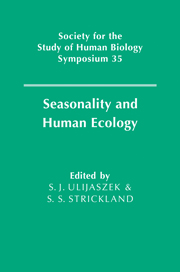Book contents
- Frontmatter
- Contents
- List of contributors
- Acknowledgements
- 1 Introduction
- 2 Seasonality and human biology
- 3 The influence of seasonality on hominid evolution
- 4 Environmental temperature and physiological function
- 5 Physiological responses to variations in daylength
- 6 Seasonality and fertility
- 7 Seasonality of reproductive performance in rural Gambia
- 8 Seasonal effects on physical growth and development
- 9 Seasonal variation in the birth prevalence of polygenic multifactorial diseases
- 10 Environment, season and infection
- 11 Seasonal mortality in the elderly
- 12 Nutritional seasonality: the dimensions of the problem
- 13 Seasonal variation in nutritional status of adults and children in rural Senegal
- 14 Culture, seasons and stress in two traditional African cultures (Massa and Mussey)
- 15 Agriculture, modernisation and seasonality
- 16 Seasonal organisation of work patterns
- Index
14 - Culture, seasons and stress in two traditional African cultures (Massa and Mussey)
Published online by Cambridge University Press: 23 January 2010
- Frontmatter
- Contents
- List of contributors
- Acknowledgements
- 1 Introduction
- 2 Seasonality and human biology
- 3 The influence of seasonality on hominid evolution
- 4 Environmental temperature and physiological function
- 5 Physiological responses to variations in daylength
- 6 Seasonality and fertility
- 7 Seasonality of reproductive performance in rural Gambia
- 8 Seasonal effects on physical growth and development
- 9 Seasonal variation in the birth prevalence of polygenic multifactorial diseases
- 10 Environment, season and infection
- 11 Seasonal mortality in the elderly
- 12 Nutritional seasonality: the dimensions of the problem
- 13 Seasonal variation in nutritional status of adults and children in rural Senegal
- 14 Culture, seasons and stress in two traditional African cultures (Massa and Mussey)
- 15 Agriculture, modernisation and seasonality
- 16 Seasonal organisation of work patterns
- Index
Summary
Over the last two decades, the influence of seasonality has appeared as a central theme in human ecology. In most cases the focus has been on objective aspects: measurable biological variations such as mortality, morbidity, birth rate, growth rate and state of nutrition in relation to seasonal environmental changes (e.g. Chambers et al., 1981; Harrison, 1988, p. 27; Foeken, 1990). In human societies, these aspects are influenced by cultural choices, which are more or less attuned to optimal biological fitness. Cultural factors which have a bearing on human biology and are influenced by seasonality include lifestyle, type of production system, choices of technology, division of labour, social organisation, time schedule, habitat choice, food consumption, and aspects of material culture. However, humans are endowed with symbolic thinking, and the non-material, psychocultural (Folkman & Lazarus, 1988) and cognitive (Laughlin & Brady, 1978, pp. 1, 13) aspects of seasonality are also important. Butzer (1982, p. 255) writes ‘identification of environmental components, resource opportunities … are all intimately related to group perception’. Through culture, the material environment is grasped as a cognised environment, an ‘intentional world’ (Shweder, 1990, p. 25) endowed with meaning and calling for actions ‘on tangible as well as on non-tangible realities’ (Augé, 1986, p. 81), each society having its own local symbolic system (Stigler et al., 1990, p. VIII).
Perception of events and coping behaviour have emotional components; they are appraised as positive/good or negative/bad according to personal and cultural views.
- Type
- Chapter
- Information
- Seasonality and Human Ecology , pp. 184 - 201Publisher: Cambridge University PressPrint publication year: 1993
- 2
- Cited by



